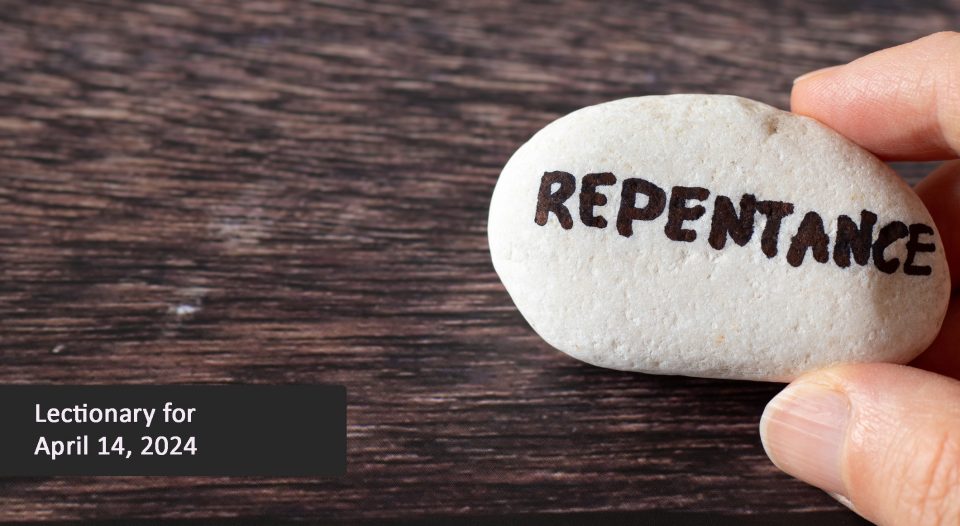Lectionary for April 14, 2024
Third Sunday of Easter
Acts 3:12-19; Psalm 4;
1 John 3:1-7; Luke 24:36b-48
Have you seen or heard those modern morality tales about acting right all the time because you never know who is around? Usually a person who is late for a job interview is rude to someone in traffic, only to find out later that the recipient of their unkindness is in charge of hiring. Or on the pilot episode of my favorite show The West Wing, Sam Seaborn asks for help from a teacher to avoid embarrassing himself in front of his boss’ daughter in the class, only to find out that the teacher is his boss’ daughter. Folks often wish they could go back and change their behavior once they find out who is witnessing their deeds. This week’s lectionary texts all discuss how, upon learning about Jesus, people seek to change their behavior.
In Acts 3, God—through Peter—has just healed a man who was unable to walk. Peter and John were adamant that they didn’t heal the man through their own power. Instead, it was the power of God—the same God who glorified Jesus. It was in Jesus’ name that Peter served as a vessel of God’s power and love to heal the man with a disability.
Then Peter told those assembled how some Jews (though almost certainly not the people actually gathered at the temple listening to him) had disowned and turned Jesus over to the Romans, who killed him. But then Peter changed tack from his accusations. Instead, he admitted that the Jews who turned Jesus over didn’t act in malice but in ignorance (Acts 3:17) since Jesus’ salvific death and resurrection was God’s plan announced through the prophets long ago (18). Therefore, God’s love and welcoming—Peter uses the word “refreshment”—are available to those who repent and return to God (19).
Peter’s hearers are called to recognize that the Lord of Life, though murdered, had risen. After recognizing who Jesus was/is, they should live lives of repentance and restoration, for those who condemned him every bit as much as for the Romans who executed him.
The psalmist also links recognition to repentance. Psalm 4 describes the position of the people as wondering “who will show us something good?” (6). Can God even do anything noticeably good, or were miracles just a thing of the past? Yet, when God shines the light of God’s countenance upon the people, they will experience joy (7) that leads to performance of righteousness and cessation of sin (4-5). Seeing and knowing God leads to transformed lives.
God’s love and welcoming—Peter uses the word “refreshment”—are available to those who repent and return to God.
1 John 3 continues the theme of knowing leading to change. An ongoing difficulty for the early church was that people weren’t recognized for the fullness of their transformed lives. How often does that happen to us? You make a big change in your life but are still thought of in the same way as you were a decade or more ago. Your friends and family just can’t quite understand the new you. My mom still calls me her baby, even though I’m an adult with kids of my own—who are also no longer babies themselves.
The author of 1 John argues that the world cannot know the disciples as God’s children because it doesn’t know God either (3:1). But those who do know God act like God, ceasing to continually sin (5-6). Of course, humans don’t attain perfection (Romans 7:15). But neither can those who know the resurrection power of Jesus persist in their sins without struggling to cease sin and practice righteousness instead (7).
Even Jesus’ disciples, when they first beheld his resurrected body, didn’t recognize him. They acted strangely, thinking that their beloved Rabbi was instead some sort of spirit (Luke 24:37). To help them recognize who he was, Jesus asked for food so they could once again share a meal, as they had done hundreds of times before (41-43). Once the disciples recognized who Jesus was, they were ready to hear his Bible study and repeated charge: preach repentance for the forgiveness of sins (44-47). Recognizing Jesus leads to lives of repentance—the rejecting and turning away from sinful practices and patterns to instead embrace God’s ways of lovingkindness to neighbor and righteousness before God.
The phrase Da Lifnei Mi Attah Omed (“Know before Whom you stand”; lightly adapted from Rabbi Eliezer’s words in BT Berakhot 28b) was engraved on the ark in front of a synagogue where I used to lead tour groups. Why? Because we as humans have a natural tendency to act differently in the presence of the King of the Universe. The trick is to recognize that we always stand before the God who loves and knows us. God wants us to act out of that love to repent and perform righteousness.






